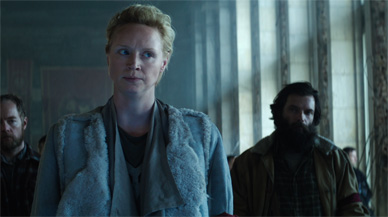Movie Review: The Hunger Games: Mockingjay Part 2
By Ben Gruchow
November 27, 2015
It’s a good thing, too, because up until the final 10 or 15 minutes, the film doesn’t have a whole lot else going on in the narrative or developmental department. The characters are sketched in colossally broad strokes, with only Katniss getting a full arc; that’s in good part because Jennifer Lawrence is so ridiculously good as this character that she sells subtle variations in emotion that the screenplay hasn’t dreamed of (consider the shifting displays of fear and confusion and suspicion on her face in the movie’s opening shot, and what it does to wordlessly, effortlessly bring us into the character’s head). Lawrence has been doing this since the first film, and her performance here supports the entire thing.
There are two sequences early on in the movie, neither of them very long, that help illustrate one of the significant differences between this franchise and something like Divergent, Maze Runner, The Giver, Twilight, and even Harry Potter (to a degree). In the more straightforward of the two, we are in a room with Katniss and Peeta Mellark (Josh Hutcherson). It’s the first time they’ve been in the same room since a memory-tainted Peeta attempted to strangle Katniss at the end of the previous film. We arrive at a pivotal point where Katniss explains to him that he is kind, and we are able to reflect on the fact that this story hangs its emotional and character content on traits and developments that survive the environment and context.
The other scene makes this even clearer: in a tense confrontation (and a nice counterpoint to Part 1’s propaganda speech), Katniss must provide a reason for a district’s citizens to rally against the Capitol. I’ll not describe what follows, except to say that it’s a remarkably visceral piece of acting. What stuck out at me during this moment is how little the series-specific terms (muttations, Dark Days, Gamemakers, Games, arenas, pods, Districts) matter to the overall impact here, and how much of it hinges on and deals honestly with fear and manipulation and ownership of identity. You can set it in Panem, or on a desert planet, or the Middle East. The props change; the underlying substance does not.
This is where so many other franchises fail, owing to their entire conflict hinging on the environment and whatever arbitrary rules are required in order to construct something more than a half-baked concept (remove the convoluted world-building minutae from The Maze Runner and try to construct any kind of substantive conflict from it; it’s sort of fun, for a few minutes). With its escalation into themes of genocide and how much responsibility you’re obligated to exercise, the Harry Potter series is the only other recent franchise in memory that commits to its implications to a similar degree, and even that story has the drawback of centering around a fairly standard iteration of the Chosen One narrative that The Hunger Games is a satiric inversion of.
Mockingjay Part 2 also goes a considerable way toward justifying the two-film split on an artistic basis, even if one is still able to argue quite cogently that a single adaptation would have been “better” (i.e. tighter and more expedient, and this a single-film adaptation would have absolutely been). The extra space afforded by the split allows Francis Lawrence and screenwriters Danny Strong and Peter Craig to properly set up a tone and trajectory that’s measurably more shaded than the motivations and actions in the first two films, which were occupied with being self-contained while setting up the skeleton of the overall framework of the final story.
Against the things that the film does right, the flaws that it does have (apart from the general thinness of the non-Katniss, non-Peeta characters) stick out more than they would have in a lesser film. The “love triangle” between Katniss, Peeta, and Gale Hawthorne (Liam Hemsworth) was already an inconsequential slip of a subplot by the end of Part 1, and it’s more or less relegated to a single dialogue scene here - one that, not coincidentally, contains the film’s flattest writing and acting. It’s not teeth-grindingly awful, but it’s one of the few areas where the accusations of bloat in the two films really have no defense. And against good work from Lawrence, Hutcherson, and the late Philip Seymour Hoffman as the head of the propaganda initiative, Julianne Moore exercises the movie’s biggest screenwriting faceplant, performing a decent-enough reading of dialogue that wasn’t needed and very nearly vaporizes the impact of the scene in which it appears.
These are ultimately minor, in the context of a movie that concludes an unusually ambitious and perceptive series of adaptations. Mockingjay Part 2 takes its time resolving the series and characters, and I was surprised at the weight and poignancy of the final minutes. I think this is a story that, like Harry Potter or Lord of the Rings, is going to hold up better than we expect over the years.
Continued:
1
2




